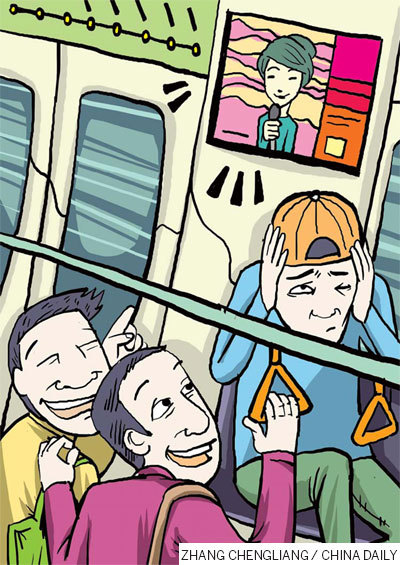Getting around in a city of 20 million people can be daunting, if not seemingly impossible. It can be even harder if you don't have a car and you're a foreigner, such as myself.
Thankfully, Beijing is a city of great mobility. Taxicabs zip down every street by the dozens, buses ply the city blocks in a timely and dependable manner. So, not having a car or a bicycle is not an excuse for immobility.

Arguably, the best way to get around the city is the subway system. It's efficient, cheap, and accessible to everyone. Instructions are given in both Chinese and English before every stop, allowing foreigners such as myself to navigate from each line and station with ease. In fact, it gives almost everyone the ability to go anywhere in the city.
But great public transportation comes at a price that goes beyond money, especially in a city as large as Beijing. The biggest problem is that the subway can get overcrowded - quickly. If one wanted to recreate the experience of seeing a popular American band at a concert, all that would be needed is to enter any subway during rush hour. The body odor, the shoving of sweaty hands, standing on tip toes - all that is missing of the concert experience is the blaring sound of deafening music. And there, televisions are pretty good at filling this particular void, because most subways are equipped with a television that is wholly unnecessary. Seats are also rarely available, so standing for the duration of your travel can be exhausting.
If I find it so awful, why do I use it? I have other options and no one is forcing me to take the subway.
But, the fact is, if I skipped the subway, I would be missing out on what makes Beijing so great.
One ride on the subway will give you a clear picture of the people that inhabit this city. From newborns that are comforted by their parents, to the elderly doing their best to stay awake before they reach their stop, the subway provides a fascinating cross-section of society.
This is an experience that you cannot recreate from the back of a taxicab. You may be able to on a bus, but I doubt it would have the same impact. It isn't the same smooth ride where the streets of the outside world have disappeared.
Perhaps, like many things in the city, a mere simple attitude adjustment would make every ride a little more enjoyable.
The mentality among subway riders is that they are the most important person traveling and that no one else can get in their way. It's the same mentality that I experience when trying to cross the road, where drivers rarely stop for pedestrians or other cars. Everyone has somewhere to go and no one seems to have the time to be courteous.
It may not always be the most pleasant experience, but a ride on the subway doesn't always have to be such a headache for everyone. Letting people get off the subway before cramming your way inside creates more room and cuts back on the need to shove other people for room. The two or three second wait isn't going to keep anyone from going to where they need to go. Standing away from the door ensures that you won't have to squeeze as much just to stand in the same spot the entire ride. And the most important thing that anyone can do is give their seat up to those who need it, such as the elderly or those with children.
The subway system is the most essential experience one can have in Beijing. Buy a ticket and take a ride around the city one day. You'll be amazed at the variety of people that live here.
And if people ever figure out how to be courteous again, a subway ride could well be the best experience in Beijing.
(China Daily by William Axford August 12, 2010)